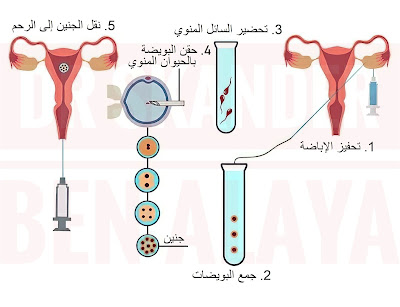In vitro fertilization (IVF) has revolutionized reproductive medicine, offering hope to countless couples struggling with infertility. Over the years, advancements in assisted reproductive technologies (ART) have significantly improved the success rates of IVF. Two crucial techniques that have been pivotal in enhancing IVF success are التلقيح المجهري and intracytoplasmic sperm injection (ICSI). In this blog, we will delve into these techniques, understanding how they contribute to improving the success of IVF treatments.
Understanding IVF and its
Challenges
IVF
involves fertilizing an egg with sperm outside the body, typically within a
laboratory setting. The fertilized egg, or embryo, is then transferred to the
woman's uterus, which may implant and develop into a pregnancy.
However,
the success of IVF is not guaranteed, and many factors can affect its outcome.
Common challenges include:
- Quality
of Eggs and Sperm: The quality
of both eggs and sperm is crucial for successful fertilization and embryo
development.
- Fertilization
Rates: Not all
eggs fertilize after conventional IVF, which can impact the number of
embryos available for transfer.
- Embryo
Quality: The quality
of embryos is essential for successful implantation and a healthy
pregnancy.
Microscopic
Insemination: A Precise Approach to Fertilization
لتلقيح المجهري, often called conventional IVF, involves
mixing eggs and sperm in a culture dish. The aim is for the sperm to fertilize
the eggs naturally.
However, this conventional method might not lead to successful fertilization in some cases due to low sperm count or poor sperm motility. Microscopic insemination offers a more precise approach to fertilization, ensuring a higher chance of successful fertilization.
During
microscopic insemination:
- Egg
Collection: Mature eggs
are retrieved from the woman's ovaries following controlled ovarian stimulation.
- Sperm
Preparation: Sperm
samples from the male partner or a sperm donor are carefully prepared,
selecting the healthiest and most motile sperm.
- Fertilization: The selected sperm is introduced
to the eggs in a controlled environment, allowing for a higher chance of
successful fertilization.
Microscopic
insemination
improves fertilization rates and provides a better understanding of
fertilization dynamics, which is crucial for selecting the best-quality embryos
for transfer.
Intracytoplasmic Sperm Injection
(ICSI): Overcoming Male Infertility
ICSI is a powerful technique to address male infertility, where a single sperm is injected into a mature egg. This method significantly improves the chances of fertilization, even when there are severe sperm-related issues.
The
ICSI process involves the following steps:
- Egg
Collection: Eggs are
retrieved from the woman's ovaries, similar to conventional IVF.
- Sperm
Collection and Preparation:
A sperm sample is collected from the male partner or a sperm donor and is
carefully prepared.
- Microinjection: Using a specialized
micropipette, a single healthy sperm is injected directly into the egg's
cytoplasm.
ICSI
ensures that fertilization occurs by directly inserting sperm into the egg,
bypassing natural barriers that might impede fertilization. This technique has
significantly improved fertilization and success rates in male infertility
cases.
Advantages of ICSI and Microscopic
Insemination
- Improved
Fertilization Rates: الحقن المجهري and
microscopic insemination significantly improve fertilization rates
compared to conventional IVF, especially in cases of male factor
infertility.
- Enhanced
Embryo Selection: By ensuring
successful fertilization, these techniques allow for better embryo
selection, increasing the chances of transferring high-quality embryos.
- Overcoming
Male Infertility: ICSI
addresses severe male infertility issues, providing a viable solution for
couples struggling with sperm-related problems.
- Reduced
Risk of Fertilization Failure:
These techniques reduce the risk of fertilization failure, giving couples
a better chance of successful IVF outcomes.
Conclusion
Microscopic insemination and intracytoplasmic sperm injection (ICSI) have revolutionized the landscape of assisted reproductive technologies, especially in the realm of in vitro fertilization (IVF). By addressing fertilization and male infertility challenges, these techniques significantly enhance IVF success rates, giving hope and opportunities for many couples to achieve their dream of having a child.
Advancements
in reproductive medicine continue to evolve, offering even more promising
outcomes for infertility couples. If you are considering IVF or related
treatments, we recommend consulting with a Lifeline Turkey specialist to
discuss the most suitable approach based on your unique situation. Ultimately,
these innovations continue to pave the way for a brighter future for
individuals and couples seeking to expand their families.

Comments
Post a Comment